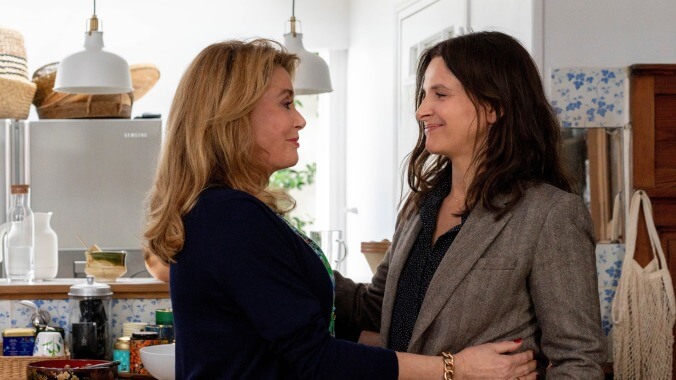Catherine Deneuve and Juliette Binoche are together at last in the minor family drama The Truth


When word emerged that Kore-eda Hirokazu, for the first time in nearly 30 years as a filmmaker, was shooting a feature outside of his native Japan, the news both did and didn’t make sense. On the one hand, Kore-eda’s work—which includes such acclaimed movies as After Life, Still Walking, and the recent Palme d’Or winner Shoplifters—has always been deeply rooted in Japanese culture, sometimes to the point of seeming nearly impenetrable to Westerners. (His 2006 samurai comedy, Hana, so bewildered American critics on the festival circuit that it never secured U.S. distribution.) On the other hand, Kore-eda’s primary subject, especially of late, has been gentle family strife, which is more or less a universal language. Could he translate his approach to another country while retaining the specificity that makes it sing?
Yes and no, it turns out. Were The Truth uncredited, with no information about its provenance having been announced or leaked, even Kore-eda’s staunchest fans might fail to recognize his hand at the helm, even though he wrote the screenplay in addition to directing. The biggest tipoff might be its intermittent, slightly overbearing use of music that can only be described as “tinkly,” with Russian composer Alexei Aigui performing a serviceable variation on the typical Kore-eda score. Otherwise, this low-key portrait of maternal angst, set in the French cinema industry (with Ethan Hawke as an American ringer), feels politely generic—too assured to be the work of a novice, but not detailed enough to make a strong impression.
Certainly, one can’t fault Kore-eda’s casting. Having conceived the role of an elderly French movie star, imperious and unyielding, he landed the most obvious choice for it: Catherine Deneuve. And to play her only child? None other than Juliette Binoche. (Surprisingly, this is the first time they’ve appeared together on screen; Kore-eda deserves some sort of special award just for finally making that happen.) Mother and daughter have never been particularly close, but Lumir (Binoche), who lives in New York and works as a screenwriter, has flown to Paris for the impending publication of La Vérité, the ostensibly revealing memoir of legendary actor—and frustratingly absent parent—Fabienne Dangeville (Deneuve). Fabienne kicks things off by exaggerating how many copies have been printed, and Lumir soon finds, upon reading the manuscript, that it’s a pack of galling lies, especially regarding her own tumultuous childhood. But Fabienne isn’t one to be cowed. “I won’t tell the naked truth,” she insists (of a book that’s literally titled The Truth). “It’s far from interesting.” Besides, Fabienne is also busy with her current film, a science-fiction drama (seemingly inspired by Interstellar) in which she plays the oldest incarnation of a woman whose daughter, thanks to time dilation, has barely aged in decades and now appears to be 50 years younger than Mom.
The ways in which Fabienne’s performance (with which she has tremendous difficulty) echoes her real-life relationship with Lumir might have been the heart of the movie, were they not so superficial and blatant. Kore-eda builds to a genuinely powerful rapprochement, beautifully acted by both stars, in which Fabienne gives Lumir the direct maternal affection she’s withheld for over half a century, then ruins the tender moment by musing aloud about how much better the scene she’d shot earlier in the day would have been had she experienced these emotions in time to draw on them. (In a devastating formal touch, Kore-eda leaves Binoche’s face out of focus as it crumbles in disbelief.) Too often, however, The Truth squanders its dramatic potential. There’s a great deal of talk about another actor, long dead, who functioned as a sort of surrogate mother to Lumir, but that unseen character never quite establishes a haunting presence (despite everyone constantly comparing Fabienne’s costar in the science-fiction film—which is actually called Memories Of My Mother, incidentally—to the dead woman). Likewise, a subplot about Fabienne’s longtime personal assistant (Alain Libolt), who quits in a huff after discovering that he’s not mentioned in the memoir, introduces a terrific idea—Fabienne doesn’t know how to apologize, so Lumir writes her a speech she can “act”—and then does virtually nothing with it. Even Hawke, as Lumir’s TV-actor husband, mostly just sits around not understanding things said to him in French, which his character doesn’t speak.
Granted, it’s entirely possible that a hypothetical Japanese version of The Truth would have suffered from many of the same issues. Not all of Kore-eda’s films have been winners. Still, the central relationship here feels atypically simplistic, aligning the viewer’s sympathy almost exclusively with Lumir. At one point, Fabienne comes right out and says that she’d rather be remembered as a bad mother and bad friend but a great actor. That remarkably blunt self-assessment is far less compelling than the casually oblivious bad parenting that fuels Nobody Knows, much less the criminally bad-yet-somehow-good parenting in Shoplifters. It’s good to see Kore-eda try to stretch himself a little, and The Truth demonstrates that his talent can survive on foreign soil. But there’s not as much powerful emotional veracity to it as one might hope.